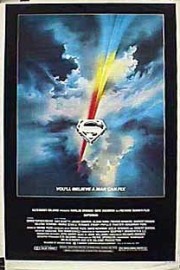Superman: The Movie
If flying through space to John Williams’s emotionally uplifting score as we zoom towards Krypton, in the opening sequence of “Superman: The Movie,” doesn’t put you in the mood for adventure, I can’t help you. In this sequence alone, we see the seeds that would set the stage for every significant superhero movie of the modern age: Tim Burton’s “Batman,” Bryan Singer’s “X-Men,” Sam Raimi’s “Spider-Man,” Jon Favreau’s “Iron Man,” and even Christopher Nolan’s “Batman Begins.” That the film remains in the upper reaches of the genre says as much about what director Richard Donner did right in this film as it does about the films that have come since.
The film begins on Krypton, as Jor-El (Marlon Brando) sentences General Zod (Terence Stamp) and his fellow insurrectionists to eternal imprisonment in the Phantom Zone. It’s not long after when Jor-El himself, a scientist who has predicted the planet’s destruction, is accused of insurrection himself, and is forced to send his young son, Kal-El, off into space alone so that he does not suffer the fate of those like him. As he travels through the stars to Earth, Kal-El is briefed on the history of the universe (and his new home planet) via a recording Jor-El has made. At the 26 minute mark of Donner’s “Extended Cut,” Kal-El crashes down in Smallville and into the lives of Martha and Jonathan Kent (Phyllis Thaxter and Glenn Ford).
The screenplay is credited to screenwriting legends such as Mario Puzo (“The Godfather” trilogy) as well as David and Leslie Newman and Robert Benton (all three of whom worked on “Bonnie & Clyde”), but the hero of the film is Tom Mankiewicz, who is credited as “Creative Consultant” because of studio politics but who was responsible for shaping the film into the classic it is. That’s not an easy task: The film producers, Alexander and Ilya Salkind, had in mind was an ambitious origin story with the scope and depth of the great literary classics. The goal had been to make two films back-to-back and release them a year apart (a familiar model now) before budgetary limitations put the focus on just finishing the first one. That conception explains the variety of tones and settings: The sci-fi seriousness of the Krypton scenes, the ’50s Americana of Clark’s time in Smallville, the “hero’s journey” as Clark goes out into the world and builds his Fortress of Solitude so that he can discover his path, and finally the adventure and comedy of Clark’s settling in at Metropolis’s The Daily Planet and the life we remember best– with Lois Lane (Margot Kidder), Jimmy Olsen (Marc McClure), and Perry White (Jackie Cooper). Too bad he soon finds himself battling with aspiring supervillains like Lex Luthor (Gene Hackman) and his bumbling henchman, Otis (Ned Beatty), and the eccentric Eve Teschmacher (Valerie Perrine) in their unusual scheme for worldwide panic and mayhem.
Comedy is the key element once we get to Metropolis, and thank God; if this film would have been as self-serious as the superhero movies that came after (with the exception of Raimi’s “Spider-Man” and “Spider-Man 2”) this film would have been a creative dead-end. It’s here where the casting of Christopher Reeve is crucial: He has that old Hollywood charisma of Cary Grant and James Stewart, which is ideal for Donner and Mankiewicz’s vision of Clark Kent, while also having an earnestness that makes his Superman easily identifiable with audiences. When he took over the role in Bryan Singer’s 2006 “Superman Returns,” Brandon Routh got a lot of flack that he was cast primarily for his physical resemblance to Reeve, but the more one watches that franchise non-starter, the more one sees he had every quality Reeve brought to both Kent and Superman; sadly, the material in that film failed him from carrying on the role further.
If Reeve is essential to us believing in Superman on-screen, the way director Richard Donner’s brings the elements together, behind the scenes, is equally crucial. Donner’s work has always lacked an identifying signature except that his films are always well crafted and rise and fall on the strength of his screenplays, meaning for every classic like this, “The Omen,” “The Goonies,” or the first two “Lethal Weapon” films, we get a film that’s less successful like “Timeline” or the last two “Lethal Weapon” films. Donner’s passion for the material here makes it soar beyond anything he’s ever done, and it permeates down to each of his collaborators, from composer John Williams to cinematographer Geoffrey Unsworth and production designer John Barry and editor Stuart Baird. In one of the superb documentaries about the making of the film, the word “verisimilitude” was used often during production; it became Donner’s mantra, and it means “resembling reality.” It’s easy to see why Donner would approach this film with such a motto; a lesser director would revel in the fantasy, believability be damned (see the theatrical cut of “Superman II,” from which Donner was fired before finishing, and “Superman III”). Over the years, Donner’s work has become less frequent, and that’s a shame– I miss the solid craftsmanship and storytelling ability he brings to the job.
All that being said, the lasting success of “Superman: The Movie” comes down to one thing: Our belief that a man can fly. How the filmmakers accomplished that I’ll leave for you to discover in the many documentaries about the film that exist; all you need to know is that Donner, Reeve, Williams, and everyone else succeeded brilliantly. No matter how many different incarnations come our way in the years to come, their 1978 masterpiece will remain a benchmark of storytelling and adventure, not just for the character but for cinema.










